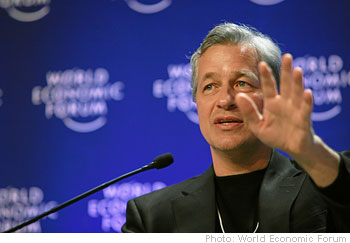 In the Washington Post, Jamie Dimon asserts that we shouldn’t “try to impose artificial limits on the size of U.S. financial institutions.” Why not?
In the Washington Post, Jamie Dimon asserts that we shouldn’t “try to impose artificial limits on the size of U.S. financial institutions.” Why not?
“Scale can create value for shareholders; for consumers, who are beneficiaries of better products, delivered more quickly and at less cost; for the businesses that are our customers; and for the economy as a whole.”
I don’t know of any serious person who believes this to be true for banks above, say, $100 billion in assets. Charles Calomiris, who studies this stuff, couldn’t find anything stronger to back up the economies of scale claim than a study saying that bank total factor productivity grew by 0.4% per year between 1991 and 1997 — a study whose author thinks that the main factor behind increasing productivity was IT investments.
“Artificially limiting the size of an institution, regardless of the business implications, does not make sense.”
Uh … obviously it makes sense. We all know that having banks that are TBTF is bad. One solution is making them smaller. Big banks may (theoretically) have benefits that outweigh the benefits of shrinking them. But shrinking them makes perfect sense unless those benefits are proven.
“To understand the harm of artificially capping the size of financial institutions, consider that some of America’s largest companies, which employ millions of Americans, operate around the world. These global enterprises need financial-services partners in China, India, Brazil, South Africa and Russia: partners that can efficiently execute diverse and large-scale transactions; that offer the full range of products and services from loan underwriting and risk management to providing local lines of credit; that can process terabytes of financial data; that can provide financing in the billions.”
Does Jamie Dimon really believe this? Doesn’t he run a bank when he isn’t writing op-ed articles? The last time Johnson & Johnson (JNJ) issued debt, it used eleven underwriters. The time before that, it used thirteen. (I only chose J&J because it was the example picked by Scott Talbott, a financial industry lobbyist.) Now, do J&J’s dozens of subsidiaries around the world all get local lines of credit from the same bank? Does J&J really want to be dependent on a single source of credit? (Actually, if that single source has a government guarantee, it could do worse.) If that’s actually true, someone please let me know. But the idea that one of the world’s largest companies would need a one-stop shop for financial services is what defies basic business sense.
Now, I’m willing to concede that there is value to having a global investment bank; at the least, you want trading operations covering all the time zones. And I’m willing to concede that there is some minimum scale to having a sophisticated trading and derivatives operation. But I go back to the number $270 billion. That’s how big Goldman Sachs (GS) was in 1998, adjusted to today’s dollars. I still haven’t heard a good argument about why the nonfinancial world has changed in a way that requires investment banks that are larger than $270 billion. I also haven’t heard a good argument why a $270 billion investment bank needs to be attached to a $1.5 trillion domestic retail bank – think of Bank of America (BAC).
“Capping the size of American banks won’t eliminate the needs of big businesses; it will force them to turn to foreign banks that won’t face the same restrictions.”
On one level, so what? If big American companies want to do business with UBS (UBS) — a bank that gets bailed out by Swiss taxpayers when necessary — that’s fine with me, and fine with those companies as well. More seriously, of course, that means that Switzerland should also break up its big banks.
“Global economic growth requires the services of big financial firms.”
Just because you keep saying the same thing over and over again doesn’t make it true.
- Bulenox: Get 45% to 91% OFF ... Use Discount Code: UNO
- Risk Our Money Not Yours | Get 50% to 90% OFF ... Use Discount Code: MMBVBKSM
Disclaimer: This page contains affiliate links. If you choose to make a purchase after clicking a link, we may receive a commission at no additional cost to you. Thank you for your support!


Leave a Reply